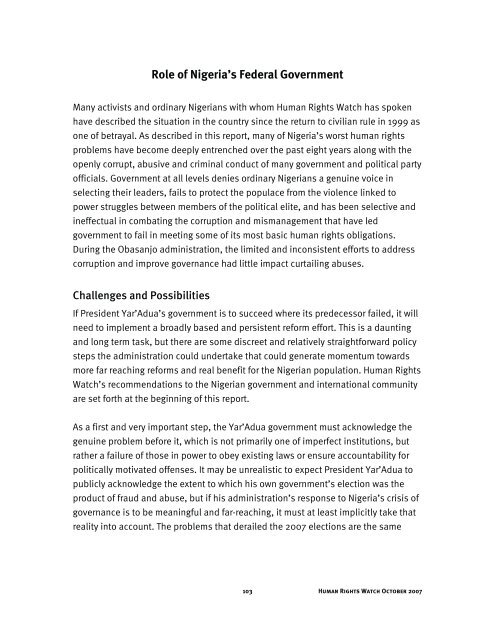Criminal Politics: Violence, âGodfathersâ and Corruption in Nigeria
Criminal Politics: Violence, âGodfathersâ and Corruption in Nigeria
Criminal Politics: Violence, âGodfathersâ and Corruption in Nigeria
You also want an ePaper? Increase the reach of your titles
YUMPU automatically turns print PDFs into web optimized ePapers that Google loves.
Role of <strong>Nigeria</strong>’s Federal Government<br />
Many activists <strong>and</strong> ord<strong>in</strong>ary <strong>Nigeria</strong>ns with whom Human Rights Watch has spoken<br />
have described the situation <strong>in</strong> the country s<strong>in</strong>ce the return to civilian rule <strong>in</strong> 1999 as<br />
one of betrayal. As described <strong>in</strong> this report, many of <strong>Nigeria</strong>’s worst human rights<br />
problems have become deeply entrenched over the past eight years along with the<br />
openly corrupt, abusive <strong>and</strong> crim<strong>in</strong>al conduct of many government <strong>and</strong> political party<br />
officials. Government at all levels denies ord<strong>in</strong>ary <strong>Nigeria</strong>ns a genu<strong>in</strong>e voice <strong>in</strong><br />
select<strong>in</strong>g their leaders, fails to protect the populace from the violence l<strong>in</strong>ked to<br />
power struggles between members of the political elite, <strong>and</strong> has been selective <strong>and</strong><br />
<strong>in</strong>effectual <strong>in</strong> combat<strong>in</strong>g the corruption <strong>and</strong> mismanagement that have led<br />
government to fail <strong>in</strong> meet<strong>in</strong>g some of its most basic human rights obligations.<br />
Dur<strong>in</strong>g the Obasanjo adm<strong>in</strong>istration, the limited <strong>and</strong> <strong>in</strong>consistent efforts to address<br />
corruption <strong>and</strong> improve governance had little impact curtail<strong>in</strong>g abuses.<br />
Challenges <strong>and</strong> Possibilities<br />
If President Yar’Adua’s government is to succeed where its predecessor failed, it will<br />
need to implement a broadly based <strong>and</strong> persistent reform effort. This is a daunt<strong>in</strong>g<br />
<strong>and</strong> long term task, but there are some discreet <strong>and</strong> relatively straightforward policy<br />
steps the adm<strong>in</strong>istration could undertake that could generate momentum towards<br />
more far reach<strong>in</strong>g reforms <strong>and</strong> real benefit for the <strong>Nigeria</strong>n population. Human Rights<br />
Watch’s recommendations to the <strong>Nigeria</strong>n government <strong>and</strong> <strong>in</strong>ternational community<br />
are set forth at the beg<strong>in</strong>n<strong>in</strong>g of this report.<br />
As a first <strong>and</strong> very important step, the Yar’Adua government must acknowledge the<br />
genu<strong>in</strong>e problem before it, which is not primarily one of imperfect <strong>in</strong>stitutions, but<br />
rather a failure of those <strong>in</strong> power to obey exist<strong>in</strong>g laws or ensure accountability for<br />
politically motivated offenses. It may be unrealistic to expect President Yar’Adua to<br />
publicly acknowledge the extent to which his own government’s election was the<br />
product of fraud <strong>and</strong> abuse, but if his adm<strong>in</strong>istration’s response to <strong>Nigeria</strong>’s crisis of<br />
governance is to be mean<strong>in</strong>gful <strong>and</strong> far-reach<strong>in</strong>g, it must at least implicitly take that<br />
reality <strong>in</strong>to account. The problems that derailed the 2007 elections are the same<br />
103<br />
Human Rights Watch October 2007

















